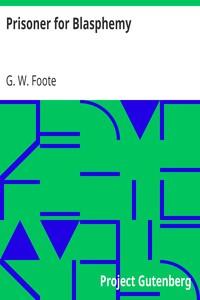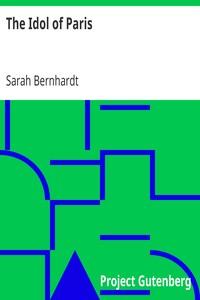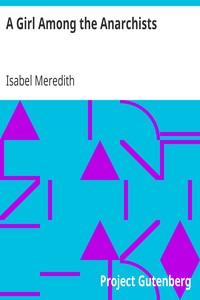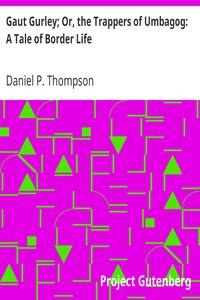Read this ebook for free! No credit card needed, absolutely nothing to pay.
Words: 71472 in 17 pages
This is an ebook sharing website. You can read the uploaded ebooks for free here. No credit cards needed, nothing to pay. If you want to own a digital copy of the ebook, or want to read offline with your favorite ebook-reader, then you can choose to buy and download the ebook.
A STRANGE CHILDHOOD
In the small hours of a bitter January morning I sat in my room gazing into the fire, and thinking over many things. I was alone in the house, except for the servants, but this circumstance did not affect me. My childhood and upbringing had been of no ordinary nature, and I was used to looking after myself and depending on my own resources for amusement and occupation.
My mother had died when I was yet a small child and, with my elder sister and brother, I had grown up under our father's eye. He was a chemist and a man of advanced ideas on most things. He had never sent us to school, preferring to watch in person over our education, procuring for us private tuition in many subjects, and himself instructing us in physical science and history, his two favourite studies. We rapidly gained knowledge under his system and were decidedly precocious children, but we had none of the ordinary school society and routine. Our childhood was by no means dull or mopish, for there were three of us and we got on very well together, but we mixed hardly at all with children of our own age, our interests were not theirs, and their boisterous ways were somewhat repellent to us.
Our father was a great believer in liberty, and, strange to say, he put his ideas into practice in his own household. He was a devoted and enthusiastic student, and for days, nay, weeks together, we would see but little of him. He had fitted himself up a small laboratory at the top of our house on which he spent all his available money, and here he passed nearly all the time he could dispose of over and beyond that necessary for the preparation and delivery of his scientific lectures. As we grew out of childhood he made no difference in his mode of life. He gave us full liberty to follow our various bents, assisting us with his advice when requested, ever ready to provide the money necessary for any special studies or books; taking an interest in our readings and intellectual pursuits. The idea of providing us with suitable society, of launching us out into the world, of troubling to see that we conformed to the ordinary conventions of society, never occurred to him. Occasionally some old friend of his would drop in, or some young admirer who had followed his scientific work in the press would write asking permission to call and consult him on some point. They were always received with cordiality, and my father would take much trouble to be of any assistance he could to them. We children used generally to be present on such occasions, and frequently would join in the conversation, and thus we got to know various people, among whom foreigners and various types of cranks were fairly in evidence.
We lived in a large old-fashioned house in Fitzroy Square where our father had settled down somewhere in the seventies soon after his marriage to a South American Spaniard, whom he had met during a scientific research expedition in Brazil. She was a girl of seventeen, his junior by some twenty years. During his journeys into the interior of Brazil he had fallen seriously ill with malarial fever, and had been most kindly taken in and nursed by a coffee-planter and his family. Here he had met his future wife who was acting as governess. She was of Spanish descent, and combined the passionate enthusiasm of a Southerner with the independence and self-reliance which life in a new and only partially civilised country breeds. She was an orphan and penniless, but our father fell in love with her, attracted doubtless by her beauty and vivaciousness in such striking contrast with his bookish way of life, and he married her and brought her home to London. He truly loved her and was a good husband in all essential respects, but the uncongenial climate and monotonous life told on her health, and she died three years after my birth, much mourned by her husband, who plunged all the more deeply into scientific research, his only other thought being a care for our education. He had lived on in the same old house which grew somewhat dingier and shabbier each year, whilst the neighbourhood fell from its pristine respectability to become the resort of foreigners of somewhat doubtful character, of Bohemian artists and musicians.
As I sat gazing into the fire many pictures of those old days rose before me. I saw our large drawing-room with its old-fashioned furniture, handsome, often beautiful, but ill-kept; its sombre hangings and fine pictures. I recalled a typical scene there with a large fire burning cheerily in the big grate, relieving the gloom of a late winter afternoon with the bright flickering of its flames. Ensconced in a roomy arm-chair, our father is seated by the fire in a skullcap and list slippers, with his favourite cat perched on his knee. Opposite him sit two ladies, the elder of whom--a quaint, nice-looking old lady, dressed neatly in black, but whose innate eccentricity succeeded in imparting something odd to the simplest and quietest of attires--is leaning eagerly forward, pouring forth a long tale of woe into my father's sympathetic ear. She is denouncing the London roughs, landlords, and police, who, apparently, are all in league to ruin her and turn her cats astray upon an unkind world. The brutality of the English poor, who consider their duty towards the feline race fully performed when they have fed them, and who pay no more attention to their morals and higher feelings than if they were stocks and stones, arouses her ire; sympathy is what she needs, sympathy to help her to face the world and continue her crusade against cruelty. She says all this in a scattered and disconnected style, jumping from one point to another, turning occasionally to her friend for support or confirmation. This friend is a meek, subdued-looking person of uncertain age, somewhat washed-out and bedraggled in appearance. Her attire is nondescript, and seems to consist of oddments bought solely because they were cheap and bearing no relation whatever one to the other. Mrs. Smuts, growing more and more absorbed in the course of her harangue on the great cat question, states that she believes in marrying cats young in life and looking strictly after their morals; and as she appeals to Miss Meggs whilst voicing this sentiment, the latter timidly interjects, "But do you think, my dear Maria, that cats can maintain themselves chaste on a meat diet? I never give mine anything more exciting than cold potatoes and rice pudding, and I find that they thrive on it, Mr. Meredith!"
At this point we children, stifling our laughter, rush headlong from the room, to vent our mirth in safety in the kitchen.
Another frequent visitor whom my imagination summoned from the grave in which he had lain now for several years past, was a tall, thin, delicate-looking man of some thirty years of age. He was by birth a Frenchman, but had lived mostly in England, his parents having come over as political exiles from the tyranny of Louis Napoleon, afterwards settling permanently in this country. He was an engineer by profession, but a poet at heart, and all his spare time and thought he devoted to tackling the problem of aerial navigation. His day was spent earning a scanty living in a shipbuilding yard, but his evenings and nights were passed in constructing a model of a flying-machine. He would bring his drawings round to our father for discussion and advice; and although he never attained success, he was always hopeful, trusting that some one of the ever fresh improvements and additions which his fertile brain was always busy conceiving would solve the difficulty which had hitherto beset him. His sallow face with its large dreamy eyes and his spare figure, clad in an old bluish suit, rusty with age and threadbare with brushing, stand out clear in my memory. There was also an old professor, a chemist like my father, who often assisted him in his experiments. He was somewhat formidable in appearance, wearing gold spectacles, and helping himself freely to the contents of a snuff-box, but he was one of the most kind-hearted of men. Children were great favourites with him, and his affection was returned with interest as soon as the shyness consequent on his somewhat gruff manner was overcome. He used to enjoy drawing us out, and would laugh heartily at our somewhat old-fashioned remarks and observations, at which we used to grow very indignant, for we were decidedly touchy when our dignity was at stake. He had nicknamed me Charlotte Corday, for, after a course of Greek and Roman history, studied in Plutarch and Shakespeare's "Julius Caesar," I had plunged into the French Revolution, glorying in its heroisms and audacity, and it had become a favourite amusement with all three of us to enact scenes drawn from its history, and to recite aloud, with great emphasis if little art, revolutionary poetry. The old professor loved to tease me by abusing my favourite heroes; and when he had at last roused me to a vigorous assertion of revolutionary sentiments, he would turn to my father and say, "There's a little spitfire for you; you will have to keep a look-out or she will be making bombs soon and blowing us all up," at which my father would smile complacently.
Our father was very charitable. He did not like to be bothered or disturbed, but he would willingly give a little assistance when asked, and the result was that our door was always besieged by beggars of various nationalities, Spaniards and Italians forming the chief contingent. Generally they confined themselves to sending in notes, which used to be returned with a shilling or half-crown as the case might be, but sometimes one would insist on a personal interview. I remember one wild-looking Hungarian, whose flowing locks were crowned by a sort of horse's sun-bonnet, who used to rush round on one of those obsolete bicycles, consisting of an enormously high wheel on the top of which he was perched, and a tiny little back one. He was generally pursued by a crowd of hooting boys, advising him to "get 'is 'air cut," and inquiring, "Where did you get that 'at?" He used to insist on seeing my father; but the help he solicited was not for himself but for various political refugees in whom he was interested. One day the professor happened to meet this wild-looking creature at our door, and inquired of my father who that maniac might be. "Oh, he is a Hungarian refugee; a good fellow, I believe. I have noticed something rather odd in his appearance, but I do not consider him mad," replied his friend.
Amid such surroundings we grew up. My elder sister, Caroline, had a notable musical gift, and even as a small child had a fine voice, which developed into a rich contralto. Our father, always anxious to do his duty by us, gave her a first-rate musical education, sending her abroad to study under famous Continental teachers, and at eighteen she made her first appearance in public, exciting much attention by the powerful dramatic qualities of her voice. It was evident that her right course was to go in for operatic singing, and this she did. She continued on the most affectionate terms with her family, but naturally her pursuit took her into quite another path of life, and we saw less and less of her as time went on. This threw my brother and myself more together. There was only a year's difference between us, and we studied together, walked, talked, played, and read together--in fact, were inseparable. Raymond was no ordinary boy. In character and in manners he was very like my father. His favourite study was physical science in its various branches; mine, history and sociological subjects. He saw things from the scientific standpoint, I from the poetical and artistic; but we were both by nature enthusiastic and dreamers, and sympathised heartily with each other's views. His ambition was to become a famous explorer; mine, to die on a scaffold or a barricade, shouting Liberty, Equality, Fraternity.
Our father took a great pride in Raymond, and carefully supervised his studies. He passed various brilliant examinations, and at eighteen, having decided to go in for medicine, was already walking a hospital. Shortly after this our father died suddenly. He was at work as usual in his laboratory when he was seized by a paralytic stroke, and in three days he was dead.
This blow quite stunned us for a time. Our father was everything to us; and the possibility of his death we had never contemplated. Though, as I have explained, he had always left us free to follow our own devices, still he was the centre round which our family life circled; we were passionately attached to him, and now that he was gone we felt at a loss indeed. We had no relatives living of our father's; our mother's family we had never known, and they were too distant to be practically available. Our father's friends were not such as to be of much help to us. Cat enthusiasts and scientific dreamers are all very well in their way, but they almost always take far more than they give in the mart of friendship. The old professor had preceded my father to his grave.
Free books android app tbrJar TBR JAR Read Free books online gutenberg
More posts by @FreeBooks










